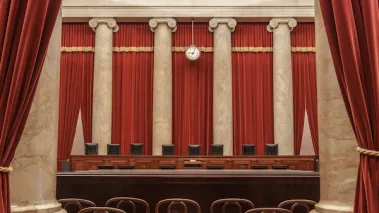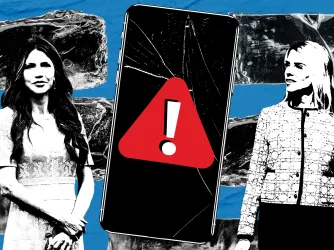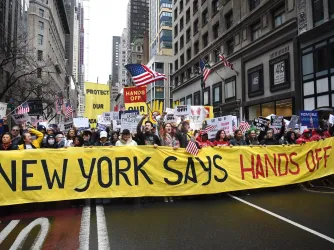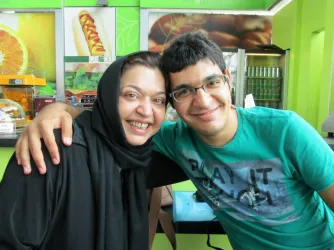Table of Contents
FIRE’s Supreme Court preview 2022-2023

Erik Cox Photography / Shutterstock.com
On Dec. 5, the Supreme Court will hear its first First Amendment case of the 2022–2023 term — 303 Creative LLC v. Elenis. In this case, the Justices could decide under what circumstances a state’s antidiscrimination law may violate the First Amendment.
And there are more cases on the docket that could impact free speech and expression.
The Court will decide whether a federal law shields internet companies from liability when its algorithm recommends content related to terrorism, and whether internet companies may be held liable under a federal antiterrorism law when the companies do not take aggressive action to purge terrorist organizations from their site. And just this week, the Justices added a new case to their docket that explores the tension between the First Amendment and federal trademark law.
Other cases remain pending, too, as the Justices determine whether to hear additional First Amendment-related appeals this term. Two petitions for certiorari — i.e., requests for the Court’s review — stand out. One will determine if the government can mandate that private social media companies host and distribute speech against their will, while the other will examine whether police officers and other government officials can be sued for damages when they behave in blatantly unconstitutional ways.
Below are summaries of some of the cases FIRE will monitor this Supreme Court term for their effect on First Amendment jurisprudence and Americans’ fundamental rights to free speech and expression.
Cases this term
303 Creative LLC v. Elenis
Question Presented:
Whether applying a public-accommodation law to compel an artist to speak or stay silent violates the Free Speech Clause of the First Amendment.
Facts: Lorie Smith owns a graphic design firm in Colorado and wishes to offer custom wedding websites for customers. Because Smith opposes same-sex marriage for religious reasons, she does not want to create custom websites for same-sex weddings, and wishes to include a message on her own website explaining that. But Colorado’s public-accommodation law prohibits businesses from discriminating against gay people or announcing their intention to do so.
In response, Smith launched a pre-enforcement challenge against the law, seeking a court ruling that it could not be enforced against her because it compels her to endorse same-sex marriage against her religious beliefs. The Tenth Circuit held that even though the law compels Smith to speak against her beliefs, it does not violate her rights because it is narrowly tailored to the state’s compelling interest in ensuring gay and lesbian customers have access to Smith’s unique website-design services, which the Tenth Circuit viewed as not replicable by other website designers.
303 Creative gives the Court another opportunity to resolve the core First Amendment questions it left unanswered four years ago.
Why it matters: This case pits the First Amendment right to free speech against public-accommodation laws barring discrimination against certain groups. Freedom of speech has historically meant the government cannot tell people what to say. And Smith argues that’s exactly what Colorado’s law does by compelling her to design websites expressing a message celebrating same-sex marriage, in which she does not believe. She says that she would not be discriminating against anyone, but would only be declining to express a particular message.
The state argues that the public-accommodation law only regulates sales — conduct, not expression — because it does not control the content of the products and services businesses choose to offer. In other words, any burden on speech is incidental because the law doesn’t require Smith to build custom websites celebrating same-sex weddings, it merely requires that she offer custom websites for same-sex weddings to the same extent she offers custom websites for opposite-sex weddings. The state says that allowing an exception to the law for sales that contain an expressive element would destroy the law’s purpose of ensuring all customers receive equal access to goods and services.
This case is in many ways a redux of Masterpiece Cakeshop v. Colorado Civil Rights Commission, a 2017 case in which a 7–2 Court set aside the state civil rights commission’s decision that a baker must provide custom wedding cakes for same-sex weddings in violation of his sincerely-held religious beliefs. But the majority in Masterpiece punted on the underlying issue of whether a law barring discrimination against gays and lesbians could limit the First Amendment rights of business owners, deciding the case instead on the narrow ground that the commission’s demonstrated hostility to religion meant it had not fairly and neutrally applied the law.
303 Creative gives the Court another opportunity to resolve the core First Amendment questions it left unanswered four years ago. The question remains: Will it do so?
Gonzales v. Google, LLC
Question Presented:
Does Section 230(c)(1) immunize interactive computer services when they make targeted recommendations of information provided by another information content provider, or only limit the liability of interactive computer services when they engage in traditional editorial functions (such as deciding whether to display or withdraw) with regard to such information?
Facts: The estate of American student Nohemi Gonzalez, killed in an ISIS attack in Paris in 2015, sued Google on claims the attackers were radicalized by ISIS recruitment videos recommended by algorithms used by Google’s video platform, YouTube. While acknowledging that Section 230, a federal law that shields websites from liability for content posted by their users, protects Google for the actual content of the videos, Gonzalez argues that Google is not immunized for its role in actively recommending those videos.
But some scholars and judges, notably including Justice Clarence Thomas, have suggested the law has been read too broadly and that the Supreme Court should narrow its scope.
The district court sided with Google, holding that it cannot be liable for content on its platforms that it has no hand in producing. As ISIS created and published the videos, the court held that the terrorist organization, not Google, is ultimately responsible for Gonzalez’s death. The Ninth Circuit affirmed, though the three-judge panel hearing the case expressed alarm at the scope of protection Section 230 provides. “Whether social media companies should continue to enjoy immunity for the third-party content they publish,” wrote the panel, “are pressing questions that Congress should address.”
Why it matters: This case is one of two this term — along with Twitter v. Taamneh, below — that implicates Section 230, a significant and increasingly debated law that immunizes social media sites and other online services (“interactive computer service[s],” in Section 230 parlance) from liability for user-generated content posted to their platforms. In other words, Facebook cannot be sued for defamation just because a Facebook user posts defamatory content on the site. Section 230 is known as the “twenty-six words that created the internet” because, without the law’s protection, the risk to websites from litigation over user-generated content would make them reticent to host it.
Thus far, Section 230 has been interpreted by courts as providing sites with expansive immunity for content posted by individual users. But some scholars and judges, notably including Justice Clarence Thomas, have suggested the law has been read too broadly and that the Supreme Court should narrow its scope.
Twitter, Inc. v. Taamneh
Questions Presented:
1. Whether a defendant that provides generic, widely available services to all its numerous users and “regularly” works to detect and prevent terrorists from using those services “knowingly” provided substantial assistance under Section 2333 [the Anti-Terrorism Act, or ATA] merely because it allegedly could have taken more “meaningful” or “aggressive” action to prevent such use.
2. Whether a defendant whose generic, widely available services were not used in connection with the specific “act of international terrorism” that injured the plaintiff may be liable for aiding and abetting under Section 2333.
Facts: The family of Nawras Alassaf, a Jordanian citizen killed in an ISIS attack in Istanbul, Turkey, in 2017 sued Twitter on claims that by failing to identify and remove ISIS propaganda on its platform, it provided material support to terrorists in violation of the federal Anti-Terrorism Act.
The district court sided with Twitter and dismissed the case, holding that plaintiffs failed to sufficiently allege Twitter “knowingly and substantially assisted” the ISIS attack as the ATA requires. Twitter had argued Section 230 shielded the site from liability, but the court dismissed the case without reaching that issue and did not even mention the law in its opinion. The Ninth Circuit reversed and sent the case back for further review, holding that the district court erred because plaintiffs did allege Twitter “knowingly” assisted ISIS and that the assistance was “substantial.”
Why it matters: This case is one of two this term — along with Gonzalez v. Google — that considers the liability of social media companies for the content that users post to their platforms. While Taamneh does not directly involve Section 230, the facts of the case and the fact that Twitter raised a Section 230 defense opens at least the possibility the Supreme Court will consider the law in its eventual opinion, especially insofar as it has taken the companion Gonzalez case (the cases present such similar issues that the Ninth Circuit consolidated them and addressed both in the same opinion).
Jack Daniel’s Properties v. VIP Products LLC
Questions Presented:
1. Whether humorous use of another’s trademark as one’s own on a commercial product is subject to the Lanham Act’s traditional likelihood-of-confusion analysis, or instead receives heightened First Amendment protection from trademark-infringement claims.
2. Whether humorous use of another’s mark as one’s own on a commercial product is “noncommercial” under 15 U.S.C. § 1125(c)(3)(C), thus barring as a matter of law a claim of dilution by tarnishment under the Trademark Dilution Revision Act.
Facts: VIP Products made a dog toy lampooning a bottle of Jack Daniel’s whiskey by mirroring its iconic shape and black label and replacing “Jack Daniel’s” with “Bad Spaniels” and “Old No. 7 brand Tennessee Sour Mash Whiskey” with “The Old No. 2 on Your Tennessee Carpet.” After VIP Products asked a federal court to declare its toy did not infringe Jack Daniel’s trademark, Jack Daniel’s countersued VIP for trademark infringement and trademark dilution. On appeal, the Ninth Circuit sided with VIP Products.
The case could have significant implications for how far First Amendment protection extends to humorous and artistic uses of culturally iconic brands.
Why it matters: The case pits the First Amendment against federal trademark law. On one hand, the First Amendment broadly protects parody and other artistic expression — and as VIP Products points out, it’s impossible to parody a brand without borrowing some of its elements. But Jack Daniels argues that humor is not a free pass to infringe and tarnish another’s federally protected trademark.
One issue to keep an eye on during oral argument: How do the Justices view VIP Products’ claim that the toy is a “noncommercial” expressive work, even though they sell it for profit?
The case could have significant implications for how far First Amendment protection extends to humorous and artistic uses of culturally iconic brands.
Pending Certification Petitions
Moody v. Netchoice, LLC
Questions Presented:
1. Whether the First Amendment prohibits a State from requiring that social-media companies host third-party communications, and from regulating the time, place, and manner in which they do so.
2. Whether the First Amendment prohibits a State from requiring social-media companies to notify and provide an explanation to their users when they censor the user’s speech.
Facts: A Florida law sought to prohibit large social media companies from banning or restricting posts by political candidates and media organizations, while also requiring the platforms to provide a “thorough rationale” for all of their content-moderation decisions and to make other disclosures. The U.S. Court of Appeals for the Eleventh Circuit held the law’s restrictions on platforms’ content moderation likely violated the platforms’ First Amendment right to exercise editorial judgment. It also held the “thorough rationale” requirement likely violated the First Amendment, but upheld the other disclosure obligations. Notably, ruling on a similar Texas law that bars social media platforms from removing or restricting content based on viewpoint, the Fifth Circuit split with the Eleventh Circuit and upheld the law against constitutional challenge. (The deadline for seeking Supreme Court review of the Fifth Circuit’s decision has not yet arrived, though plaintiffs and the state agreed to a stay of enforcement pending a petition for Supreme Court review.)
The Supreme Court’s decision could have major ramifications not only for social media platforms, but also for other internet forums and websites that regulate their users’ speech.
Why it matters: Millions of Americans use social media. The platforms’ content moderation practices are a consistent source of controversy. Some claim the platforms overpolice speech and censor disfavored political views, while others argue they don’t do enough to combat harmful speech. The question in this case is whether the government can force large social media companies to distribute speech against their will.
The platforms argue the First Amendment protects their decisions about what speech to disseminate or promote, similar to how newspapers have the right to decide what appears in their pages — an exercise of editorial judgment that is inherently expressive and thus constitutionally protected. Florida and Texas claim their laws regulate censorship conduct that doesn’t implicate the First Amendment. The states frame these laws as protecting citizens’ ability to participate in the modern public square.
The Supreme Court’s decision could have major ramifications not only for social media platforms, but also for other internet forums and websites that regulate their users’ speech, as well as — depending how any eventual Court decision here is written — the protection for editorial discretion in all media.
Novak v. City of Parma, Ohio
Questions Presented:
1. Whether an officer is entitled to qualified immunity for arresting an individual based solely on speech parodying the government, so long as no case has previously held the particular speech is protected.
2. Whether the Court should reconsider the doctrine of qualified immunity.
Facts: Anthony Novak made a parody of the Parma, Ohio, police department’s Facebook page. Despite clear First Amendment protection for political parody, the police arrested him for it after a weeks-long investigation. After Anthony was acquitted at trial, he sued the police for violating his constitutional rights. But the lower courts granted the police qualified immunity for the arrest, stripping Anthony of his only legal remedy just because he could not point to a prior case holding that his specific style of parody was protected speech.

FIRE Supreme Court amicus brief pushes back on qualified immunity for First Amendment violations
Rights need remedies. This is the point FIRE argued in an amicus brief filed in support of Anthony Novak’s request for the Supreme Court to hear his case.
Why it matters: Political parody and satire have deep historical roots in our nation’s free speech tradition. It should have been obvious that arresting Anthony for poking fun at the police violated the First Amendment. As FIRE argues in its amicus curiae brief supporting Anthony, the Supreme Court should grant Anthony’s petition and clarify that when officials violate the First Amendment in obvious ways, courts should deny qualified immunity even without having a prior case with similar facts. As FIRE explains, when government officials — like the Parma police — are not making split-second decisions but rather have ample time to recognize the First Amendment principles making a violation obvious, the usual reasons for qualified immunity all but disappear.
Simply put, officials should not escape constitutional accountability just because they are the first to violate the First Amendment in a particularly blatant way. A decision in Anthony’s favor will help preserve damages as a remedy for obvious First Amendment violations and deter officials who might otherwise trample expressive rights.
Correction: This post initially listed both questions on which 303 Creative petitioned for certiorari. The Court only granted certiorari on the single Free Speech Clause question though, declining to consider the Free Exercise Clause question also raised in the petition.
Recent Articles
Get the latest free speech news and analysis from FIRE.

FIRE sues Bondi, Noem for censoring Facebook group and app reporting ICE activity

Deep dive into New York’s proposals to ban demonstrations near houses of worship

Iran replaced my mother’s voice with silence


